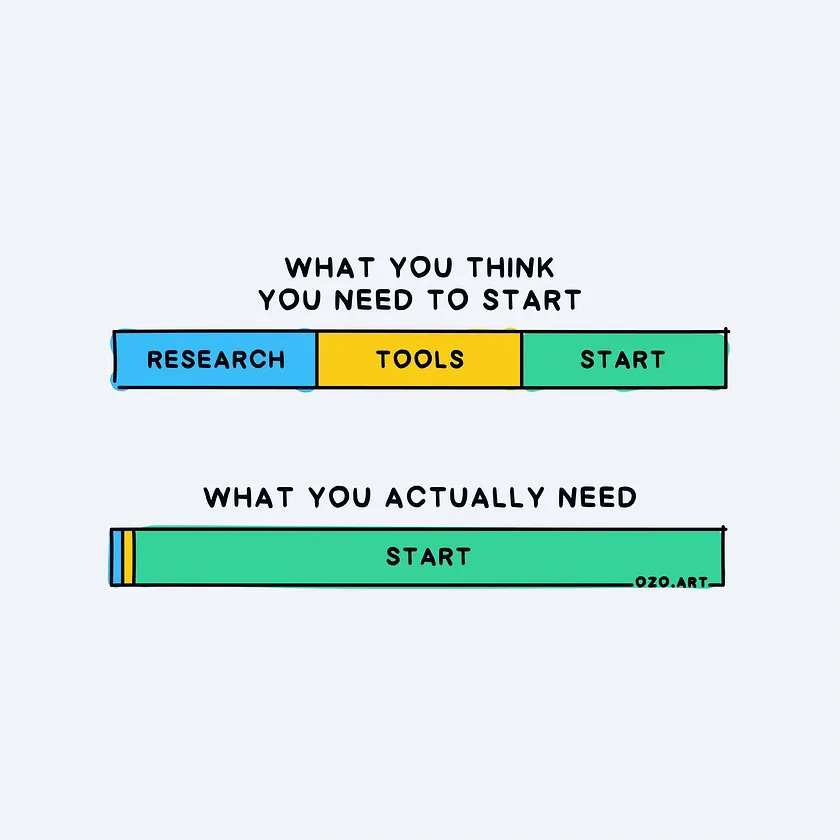The Zeroth Step: Putting Things in Place for a Yes
Because what happens before the first step really counts
From Footnotes for Flourishing – reflections on psychology, personal development, and growth.
When I started drafting this post, I was in one of those ‘stuck’ moments – clear on my plans, but less clear on how to prioritise what to do first. I sort of know what it is I have to do (for others) and want to do (for myself), but that ‘sort of’ is part of the problem. It’s too nebulous, so I don’t start.

Indeed, starting (or rather, not starting) is very often the problem, as Janis Ozolins illustrates in the beautifully simple cartoon above. The tricky thing is taking that first metaphorical or literal step – typing the first word, putting in the first search term, swimming the first length. But even before the first step, it’s the zeroth step, setting things up so that you can take the first step, which may be the real culprit. These prerequisites – such as finding the relevant email to reply to, locating the tools for the job, or the ingredients for your culinary creation – enable us to start the task ‘for real’.
Turning intention into action isn’t always easy. Why is that first step often so hard? Why do we procrastinate?
Fear of Doing
I’ve already written about stepping outside one’s comfort zone, but it’s worth asking why that feels so uncomfortable. In the end it usually comes down to fear, either of discomfort itself, or of not coping if it does occur. Spoiler: we usually can cope.
It helps to name what those worries are. For example, fear of failure and fear of success are well documented, as explored in this post from The Valued Life. We are often our own worst critic, and the anxiety about being seen as we really are, or showing our work to someone else, particularly an expert, tends to make us uncomfortable, even though it usually turns out far better than we feared. And then there’s the fear of success – the worry that if it goes well, I’ll be expected to do it again, and next time I might not manage. Am I setting myself up to fail in the future?
Fear freezes us. At the same time, the promise of reward can distract us from the task at hand.
Instant Gratification
Tim Urban’s wonderful writing on procrastination introduces us to the ‘instant gratification monkey’, who just wants to play all the time, and get that dopamine-hit reward now, rather than at some point in the future. This is a behaviour Walter Mischel’s Marshmallow Test studies showed decades earlier, demonstrating that some people struggle to delay gratification: being willing to work now for a larger reward later, rather than taking the quick win immediately.
One of the instant gratification monkey’s bad habits is to get us to choose the path of least resistance – rather than working on the essay or report or tax return, it would be so much easier to make a cup of tea, play just another level of Candy Crush, or check for new notifications. And as Steve Peters might say, the monkey has a chimpish accomplice – that emotional, impulsive part of us that wants to play rather than accept the potential discomfort. Our human side needs to look beyond that quick win, have its eyes on the prize, and simply start.
But we can only do that if we know what the task actually is…
Goals, Tasks, and Steps
As I noted at the top of this post, we may ‘sort of’ know our goals and the tasks needed to get there, but without enough clarity to see the next step. I’m guilty of this: being curious by nature, many of my goals are of the form “find out more about x”. But because I haven’t worked out quite what ‘find out more about’ actually means or what first step I could take out of an apparently infinite number of possibilities, I just… don’t.
For instance, I’d like to learn about Canva – which I’ve heard a bit about from students, colleagues, and on the web – so that I’m competent to use it when appropriate. So I wrote ‘Investigate Canva’ in my to do list, and of course I never did it – until I reframed it as an actionable task, such as watching one short YouTube tutorial. Then it immediately becomes more approachable.
The Zeroth Step
But even if we are prepared to step up to the plate, roll our metaphorical sleeves up, and start that task which has been hanging over us, we can still be brought up short by not having what we need. Worse still, because we’re unsure what information we require, or where we can find it, we may not even know quite how to enable that first step. One reason I put things off is concern about the zeroth step. I convince myself I won’t find what I need, so I don’t look, just in case I prove myself right. Or maybe, just in case I do find it – but that’s another story.
So what enables us to take that zeroth step? Perhaps personal characteristics like resilience (to cope with the potential discomfort), discipline (doing it anyway and shouting the instant gratification monkey down), and self-worth (how many times do we not start things because we don’t think it matters enough, and by extension that we don’t matter enough either?). Recognising your own strengths and values should make taking that zeroth step easier. Not everyone struggles with zeroth steps, of course. For instance, a sporty friend of mine couldn’t swim, even as an adult. So rather than deciding to learn to swim for its own sake (as a first step), saying ‘yes’ to a triathlon made swimming the zeroth step – as a prerequisite for doing a triathlon.
I may not go to such extreme lengths (pun intended), but sometimes, the zeroth step looks less like planning and more like showing up – as I’ve been doing for the past 4 weeks at parkrun, for instance.
So What Made parkrun Different?
Midway through writing this blog, I did my fourth parkrun (see my previous post), and somehow slashed more than two minutes off my personal best. The sun was shining; I felt energised and briefly unstuck. But I’d also taken the zeroth step of putting on my running kit and leaving the house. Accountability might have played a role (another parkrunner was giving me a prearranged lift), but also I stopped worrying about whether I could be bothered to go and just did. This vividly shows that procrastination is contextual, not a character flaw, but it did make me wonder what it is about parkrun that’s different from other tasks which I do keep putting off.
Perhaps it’s about the fear of being judged. If I don’t do parkrun one week, it’s likely that no one will notice – we tend not to be aware of what other people don’t do unless it affects us directly. But if I publish this blog and it doesn’t land well, then you, dear reader, might be unimpressed, and I’ve created the conditions for my self-worth, based on other people’s views, to take a hit. In fact, I’ve noticed that I’m finding this blog post harder to write than previous ones, which seemed to almost write themselves. Perhaps it’s rather closer to the bone, given I’m writing about the stuckness of the situation I’m currently inhabiting – meta-writing, if you like. So it’s taken a bit more resilience and effort. By coincidence (or maybe not), while drafting this post I had a coaching session on procrastination, and some of what we discussed has found its way into these words.
From Zero to Starting to Done
Coping with discomfort, delaying gratification, and clarifying our goals all help us start, but underneath that there’s also the small matter of preparation – that zeroth step. This might not even be action at all, but giving ourselves permission – to open the document, to breathe, to say yes before we’re ready. And it turns out that accountability – whether to a running partner, a coach, or even an AI chatbot – can be part of the zeroth step: it’s easier to turn up when someone else expects you to do so.
Sometimes the zeroth step can even be a mental reframing, turning ‘I can’t be bothered’ into ‘I choose to’ – it’s not yet doing, but it is reclaiming agency. I may call myself a procrastinator, but perhaps I’m just someone who hasn’t yet learned how to begin well.
Here’s to noticing how our own zeroth steps – the ways we get ready, or hold ourselves back – can help us move through stuckness and put things in place for a yes.
Image credits:
What you need to start - here
Other images - via ChatGPT



So many truths and amazing nuggets of wisdom here - I’m taking notes, I very much need this post right now!